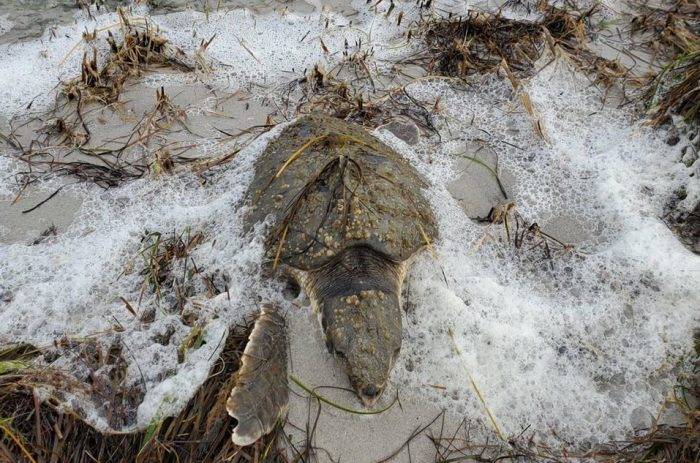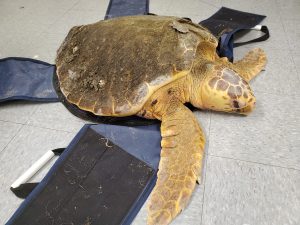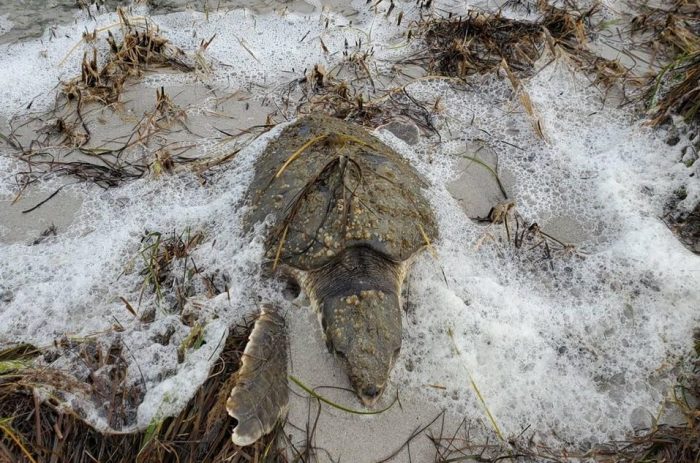
As the temperatures on Hatteras and Ocracoke Islands start to drop in the winter months, cold-stunned sea turtles begin to make a more regular appearance along the soundside beaches, and several sea turtles have already been rescued in the past few days, following the Outer Banks’’ recent cold spell.
“We just touched cold-stun temps in the last couple of days, and did have two green turtles and two loggerheads gathered up and sent to the STAR center [at the Roanoke Island Aquarium],” stated long-time Network for Endangered Sea Turtles (NEST) Hatteras Island Coordinator, Frank Welles. “Since it was marginally cold, these turtles probably had other issues. It is typical for this time of year.”

Lou Browning of Hatteras Island Wildlife Rehabilitation also announced three recent sea turtle rescues in a social media update, which included a 120-pound loggerhead turtle that was found on November 27. “Kind of strange coming in this early, since the water temperature in the sound is still 49,” stated the update.
As cold-blooded reptiles, sea turtles derive heat from their surroundings, and when they become too cold, their metabolism slows, prohibiting them from moving and ultimately from migrating to warmer waters. This cold-stunned scenario can turn deadly, as once in an immobile and lethargic state, the sea turtles can have difficulty raising their heads above water to breathe, and can eventually drown.
Local volunteers regularly monitor the Hatteras Island shorelines after a cold spell, looking for cold-stunned sea turtles in need of assistance. The volunteers primarily search for stranded turtles along the soundside, covering private property in the villages and areas that are not routinely patrolled by the National Park Service. Welles, for example, lives near the Frisco Woods Campground, so he patrols his own backyard, as well as the long stretch of soundfront that borders this corner of Frisco.
The number of sea turtles that the Hatteras Island volunteers rescue can vary greatly from year to year. The winter of 2019 / 2020 was a particularly busy season, with more than 100 sea turtles rescued after a single cold snap in January alone. However, last winter, which had predominantly warmer temperatures that were well above freezing, reported fewer rescues, and was a less active year than its predecessors.
Although temperatures are expected to climb again to the 50s and 60s over the next few days, Welles said that this last cold snap indicated that the season for cold-stunned sea turtles has started, and the public should be on the lookout.
“I would say we definitely kicked off the cold-stun season,” said Welles. “Looks like it will warm up again for a while, but stay tuned.”
How You Can Help:
- If you spot a cold-stunned sea turtle in or along the Pamlico Sound, contact the 24-hour NEST hotline at 252-441-8622. You can also call Hatteras Island Wildlife Rehabilitation at 252-475-4217, or the National Park Service at 252-216-6892.
- For more information on NEST, and to make a donation or learn about volunteer opportunities, visit http://www.nestonline.org/.
- For more information on Hatteras Island Wildlife Rehabilitation and/or to inquire about making a donation, visit their Facebook page at https://www.facebook.com/pg/Hatteras-Island-Wildlife-Rehabilitation-316636688958/.
- To make a donation to Outer Banks Wild Care, which also provides rehabilitation services on Hatteras Island, mail checks to Outer Banks Wild Care, P.O. Box 324 Buxton, NC, or donate via their PayPal account at outerbankswildcare@centurylink.net









